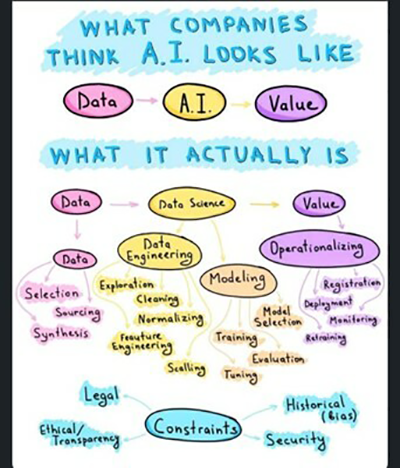 In today's interconnected and ever-evolving world, businesses expand their operations globally, often managing a diverse workforce across various countries and regions. This globalization brings many benefits, but it also introduces complex challenges in managing global payroll effectively. Enter artificial intelligence (AI), a game-changer for global payroll professionals that is transforming the landscape of global payroll management, making it more efficient, accurate, and compliant.
In today's interconnected and ever-evolving world, businesses expand their operations globally, often managing a diverse workforce across various countries and regions. This globalization brings many benefits, but it also introduces complex challenges in managing global payroll effectively. Enter artificial intelligence (AI), a game-changer for global payroll professionals that is transforming the landscape of global payroll management, making it more efficient, accurate, and compliant.
The Complexity of Global Payroll Management
Global payroll management is no walk in the park. It involves calculating and disbursing salaries, complying with multiple tax codes, adhering to local labor laws, and navigating currency fluctuations, all while ensuring accuracy and timeliness. The complexity increases exponentially when companies have a presence in various countries, each with their own set of rules and regulations.
Traditionally, managing global payroll required extensive manual labor, leading to a high risk of errors, delayed payments, and noncompliance issues. This is where AI steps in, offering innovative solutions to streamline and enhance the entire process.
Automated Payroll Calculations
One of the primary ways AI assists global payroll professionals is through automated payroll calculations. AI-powered systems can handle complex payroll calculations, including tax deductions, overtime, bonuses, and currency conversions, with unparalleled speed and accuracy. This reduces the risk of errors and saves a significant amount of time that would otherwise be spent on manual calculations.
AI algorithms can adapt to changes in tax laws and labor regulations across different countries, ensuring that payroll remains compliant with local requirements. This adaptability is particularly crucial in an era where legislative changes can occur frequently.
Data Management, Integration
Global payroll management involves handling vast amounts of data, from employee information to financial records. AI-driven data management tools can organize and process this data efficiently. These systems can also integrate seamlessly with various HR and financial software, enabling real-time data synchronization and reducing the need for manual data entry.
Moreover, AI can identify discrepancies or inconsistencies in the data, such as missing or incorrect information, flagging them for review by payroll professionals. This proactive approach ensures that payroll data is clean, accurate, and ready for processing.
Enhanced Compliance
Staying compliant with local labor laws and tax regulations is a critical concern for global payroll professionals. Noncompliance can result in significant fines and damage to a company's reputation. AI plays a pivotal role in ensuring compliance by constantly monitoring changes in legislation and automatically adjusting payroll calculations accordingly. Additionally, AI-driven analytics can identify potential compliance risks by analyzing historical data and comparing it to current regulations. This proactive approach allows payroll professionals to address compliance issues before they become costly problems.
Employee Self-Service
AI-driven payroll systems often include employee self-service (ESS) portals. These portals empower employees to access their payroll information, view payslips, and make changes to their personal details, such as banking information or tax withholding preferences. This not only reduces the administrative burden on payroll professionals but also enhances employee satisfaction by providing transparency and control over their payroll-related matters.
Fraud Detection, Prevention
Payroll fraud is a global issue that can have severe financial repercussions for organizations. AI can help detect and prevent fraudulent activities by analyzing payroll data for irregularities and anomalies. For example, AI algorithms can flag unusual payment patterns, duplicate entries, or unauthorized changes to employee records. By identifying potential fraud in real time, AI helps global payroll professionals take immediate action to mitigate the impact and prevent further fraudulent activities.
Scalability, Cost Efficiency
As businesses expand globally, their payroll needs grow exponentially. Traditional payroll systems often struggle to scale efficiently, resulting in increased administrative costs and complexity. AI-driven payroll solutions can easily scale to accommodate the needs of growing organizations without significant additional overhead.
By automating many aspects of payroll processing, AI reduces the reliance on manual labor, which can lead to substantial cost savings over time. This cost efficiency is particularly beneficial for businesses with tight budgets or those looking to allocate resources more strategically.
Future Trends, Challenges
While AI has already made significant strides in revolutionizing global payroll management, it is essential to acknowledge that the field continues to evolve. Future trends in AI, such as the integration of machine learning (ML) and predictive analytics, will further enhance the capabilities of global payroll systems.
However, as AI technology advances, it also brings new challenges, such as data security and privacy concerns. Global payroll professionals must remain vigilant in ensuring that sensitive employee data is protected and that AI systems comply with applicable data protection regulations, such as the General Data Protection Regulation (GDPR) and the California Consumer Privacy Act (CCPA).
As AI technology continues to evolve, global payroll professionals must embrace these innovations to stay competitive and ensure the efficient and compliant management of payroll on a global scale. By doing so, businesses can navigate the complexities of a global workforce with confidence, accuracy, and agility.